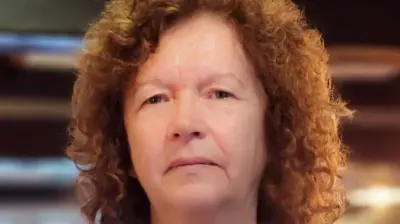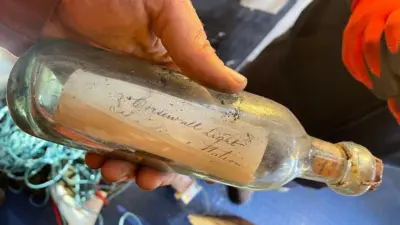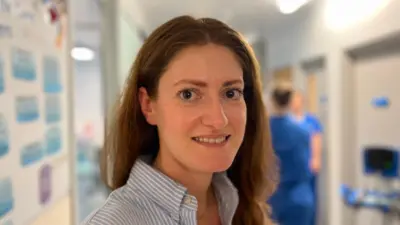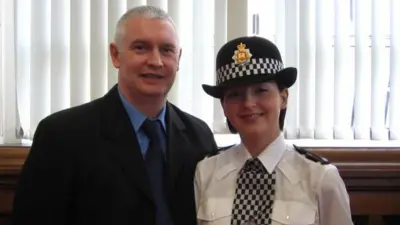We've updated our Privacy and Cookies Policy
We've made some important changes to our Privacy and Cookies Policy and we want you to know what this means for you and your data.
'Emergency fund' to fast-track cancer drugs
The government has announced a ÂŁ50m fund which should give very sick cancer patients access to drugs sooner.
It will mean that from October, rather than next year, doctors in England can offer drugs which have not been approved by the rationing body NICE.
The announcement was made at the launch of a study showing that the UK lags in providing the newest cancer drugs.
The fund will be financed by ditching the former government's plan for free personal care for the old.
It means that cancer patients will be able to access new drugs earlier to help extend life by weeks or months or improve quality of life in the final stages of the disease.
The government's cancer tsar Professor Sir Mike Richards, who led the research into the UK's ranking on drug provision, stressed however it would not improve overall survival rates.
Health Secretary Andrew Lansley said: "I promised that I would help patients in England get cancer drugs that are readily available in the rest of Europe.
"It's a scandal that we are strong in cancer research and participation in clinical trials in the UK, yet NHS patients aren't always seeing the benefits from the research swiftly enough.
"Patients should have access to innovative cancer drugs that can extend or improve their quality of life and which their doctors have recommended, which is why I'm determined to take action now."
Not a cure
into the international variations in drug use compared treatment for a series of diseases, including cancer, heart disease, dementia and arthritis.
While the UK scored highly when it came to providing drugs such as statins and treatments for acute myocardial infarction, it was ranked relatively low on giving out drugs for dementia, multiple sclerosis and cancer drugs launched within the last five years, and performed around average on older cancer drugs.
Many of the drugs for non-cancer conditions had been approved by the drugs rationing body NICE, said Professor Richards, and there was no reason why clinicians should not be prescribing these when appropriate.
But some of the newer cancer drugs had not been approved by the body, and it is access to these that the initial ÂŁ50m fund should provide access to.
The UK was rated 12 out of 14 developed countries - which included much of Western Europe, North America, Australia and New Zealand - when it came to the cancer drugs which had come on the market within the last five years.
But crucially the study did stress there was no necessary correlation between drugs expenditure and survival. Denmark for instance rates relatively high on access to cancer drugs, but is fares poorly against the European average when it comes to survival rates.
"I honestly do not think that drug usage is linked to survival," said Professor Richards.
"Early diagnosis remains the most important factor."
Decision-making
The ÂŁ50m fund will be accessible from October, ahead of a further cancer drugs fund to be launched in April 2011. It was initially thought this fund would be to around the ÂŁ200m mark, but ministers said that the economic climate meant this could no longer be guaranteed.
It is unclear exactly how decisions will be made as to which patients are given drugs previously denied, but it is hoped specialists will form regional teams to consider both individual and group cases.
Ministers insisted the plan was not intended to undermine NICE, which carefully weighs up the costs and benefits of drugs.
Sir Andrew Dillon, the chief executive of the body, said there "will always be exceptions to our recommendations which are justified on clinical grounds.
"A national fund to meet the cost of these exceptional cases, administered in a consistent way complements NICE guidance and we are happy to work with the new arrangements announced today."
Hilary Tovey, policy manager at Cancer Research UK, said: "Anything that helps patients get drugs faster is welcome. We know that the UK has a low uptake of new drugs compared to other countries, and hope that this new fund will help address this.
"We look forward to seeing more detail about how the fund will work in practice and we will be monitoring its impact. We want to ensure that all cancer patients are getting the treatments which might benefit them."
Steve Williamson, a cancer pharmacist from the Royal Pharmaceutical Society said: "It is worth remembering that those medicines that have not been funded are life extending medicines and not curative.
"In the past the NHS has had to make tough choices, and has not been able to fund treatments that for the average patient can extend life by 3 months or less. This can cause great distress for cancer patients as there is always a chance that for an individual patient the drug will work particularly well."
Top Stories
More to explore
Most read
Content is not available








